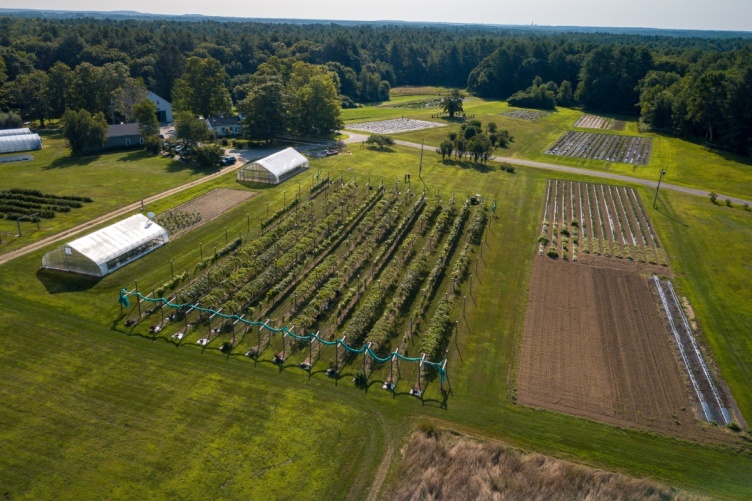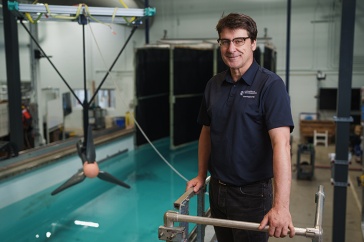
UNH Woodman Horticultural Research Farm. Credit: Scott Ripley/UNH
Growers and the public are invited to visit two research farms at the University of New Hampshire on Durham Farm Day Saturday, Aug. 21. The Woodman Horticultural Research Farm and the Fairchild Dairy Teaching and Research Center, both facilities of the New Hampshire Agricultural Experiment Station, will be open for free public tours. Preregistration is required.
The Woodman Horticultural Research Farm tour will take place from 2 to 3 p.m., and the Fairchild Dairy Teaching and Research Center tour will be held from 9:30 to 10:30 a.m. As of Monday, June 28, masks are optional outside. If fully vaccinated, masks are optional indoors; anyone who is not vaccinated must wear a mask indoors as recommended by the Centers for Disease Control.
The Woodman Horticultural Research Farm is one of the two horticultural farms that are part of the NH Agricultural Experiment Station at the UNH College of Life Sciences and Agriculture. Located at 70 Spinney Lane, the primary activities of this approximately 155-acre farm are research, teaching, and outreach on the production of horticultural and ornamental crops. The farm specializes in conducting research on new cultivation methods and varieties of fruits and vegetables.
Visitors to the farm will learn more about recent and ongoing research projects, which include reducing the dependence on pesticide applications with Integrated Pest Management, assessing pollinator habitat, using high tunnels to hasten and extend the growing season for fruits and vegetables, using reflective plastic mulches to increase per-acre yields of vegetables, evaluating seedless table grape and eggplant varieties, breeding organic strawberries, redomesticating quinoa in New Hampshire, and leading the most expansive kiwiberry breeding research project in the nation.
The Fairchild Dairy Teaching and Research Center is representative of a typical New England Dairy operation, thereby developing new knowledge and management expertise for the region’s dairy farmers. It houses about 90 milking-age cows and approximately 70 growing, replacement animals. Included in that number is the 20-cow, student-managed CREAM herd (CREAM is the acronym for Cooperative for Real Education in Agricultural Management). Research at the farm focuses on nutrition for lactating cows and improving health of calves and heifers.
The Fairchild Dairy Center has been long recognized for its quality milk and operations. The farm has received numerous Gold Quality Awards from the Dairy Farmers of America and has been recognized as a New Hampshire Quality Milk Producer by the New Hampshire Department of Health and Human Services. The farm has received Quality Milk Awards from Dairy One for consistently producing high quality milk with a low somatic cell count.
Preregistration for tours is required as capacity is limited to 25 attendees per tour. To preregister, visit https://colsa.unh.edu/nhaes/register. Directions to Woodman Farm: https://colsa.unh.edu/facility/woodman-horticultural-research-farm. Directions to the Fairchild Dairy: https://colsa.unh.edu/facility/fairchild-dairy-teaching-research-center.
Founded in 1887, the NH Agricultural Experiment Station at the UNH College of Life Sciences and Agriculture is UNH’s first research center and an elemental component of New Hampshire's land-grant university heritage and mission. We steward federal and state funding, including support from the USDA National Institute of Food and Agriculture, to provide unbiased and objective research concerning diverse aspects of sustainable agriculture and foods, aquaculture, forest management, and related wildlife, natural resources, and rural community topics. We maintain the Woodman and Kingman agronomy and horticultural research farms, the Macfarlane Research Greenhouses, the Fairchild Dairy Teaching and Research Center, and the Organic Dairy Research Farm. Additional properties also provide forage, forests, and woodlands in direct support to research, teaching, and outreach.
-
Written By:
Lori Tyler Gula, PhD | NH Agricultural Experiment Station | lori.gula@unh.edu | 603-862-1452

















































